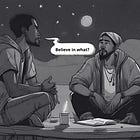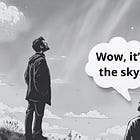Atheism Seems So Safe
I want to do more than "engage atheism," so I'm busting out of the bubble.
I have always admitted that I am not trying to “engage atheism” for the purpose of becoming an atheist. Indeed, for the Christian who understands that accepting the gift of faith also brings the unity of infused virtues to bear in her life, and for the one who has walked that path for almost twenty years now, abandoning the course is impossible. It’s not a weakling bias or fear of change. As for many Christians, my resolve is more like the resolve to go on living. I do not question whether I need food or oxygen; I know it to be true. I am focused on how to do it well. I am looking for wisdom. The proverbial leap of faith took more courage than I thought I had because it meant changing my entire world view. To me, atheism seems so safe and, and yet, so unsatisfying.
While I was writing the week-long thesis series back in June, I said on Day 5: Walking with Aristotle that I was frustrated with philosophy. Unlike the physical sciences, there are various philosophical systems from which to choose. How is a student supposed to know which philosophical system to pick? How do we engage across philosophical systems? That is the impasse I find with atheism. We fundamentally have opposing world views.
I consider myself a committed Thomist now because that is the system I have chosen in my studies. St. Thomas Aquinas integrated Aristotle’s philosophy into Christian theology, and it has taken me years to see how it all fits together and how it might be extended to modern science. Atheists seem unwilling to engage on Thomistic terms. As I said before, unless one of us gives, I don’t see how engagement works.
Still, I wanted to address a comment left by Desert Naturalist (anonymous). He is not only the number one atheist commenter but is actually the person who gave me the motivation to start this Substack in the first place. He encouraged me to renew my involvement in the theist-atheist debate now that I have studied philosophy. (I used to write for Strange Notions and have addressed atheism over the last ten years as I wrote about faith and science.) I deeply appreciate his patience and guidance and have read many of the resources he recommends. He is also a philosopher, so I have a lot to learn from him.
Desert Naturalist left (in a comment) a long excerpt from a new book edited by Kenneth Williford at the University of Texas: Hume's Dialogues Concerning Natural Religion: A Philosophical Appraisal (2024). His insights deserve a response. Here’s the quote:
It all turns on what one would think to be fairly straightforward matters: one has no good reason to believe in explanatorily gratuitous entities—tails that wag no dogs, so to speak; and, given competing explanatory strategies, ontologically conservative ones, especially if they have been successful in multiple prima facia disparate domains, are, ceteris paribus, preferable to those that require the introduction of categorically new entities (thus, e.g., naturalistic explanations of mystical and religious experiences drawn from Neuroscience, Psychology, and the Social Sciences, are preferable to supernatural explanations of them; cf. Fales 2010). In other words, parsimony, consilience, and observational continuity carry a lot of epistemic weight—more weight than the theist has yet been able to move. This is certainly in the spirit of Philo and would justify a motivated skepticism towards religious claims that cannot be extended to the “unobservables” sometimes postulated in the sciences. One should compare what is, in effect, Fales’ take on the demarcation problem with Glymour’s. Is there a debate to be had between them? In one sense, Fales does not see a demarcation problem: natural theology and arguments from religious experience can be treated with precisely the same epistemic tools with which we treat any common sense or scientific hypotheses; and when so weighed, they are found quite wanting. Religious hypotheses, then, are not categorically different from commonsense or scientific hypotheses; rather, they are just hypotheses about the world that have not fared very well epistemically speaking. (pp. 11-12)
(NOTE: The full introduction is given in the Amazon preview at the above link.)
Desert Naturalist suggests that this text points to one way to resolve some methodological issues in the debates between atheists and theists. He seems to agree that the question comes down to world view. If so, then we should be asking which world view is correct rather than running to our individual domains. To inquire about world view, he recommends, per Williford, that we test religious hypotheses “the same way as we do other metaphysical or commonsense hypotheses” (see comment). Using Graham Oppy’s language, that is to say we examine “theoretical virtues” we generally think are “truth-conducive.”
To give some background, originally, I asked Desert Naturalist for a recommendation on the best philosophers who represents the atheist position, and he recommended Oppy (among others). I read some of Oppy’s books and wrote about them in these posts:
Getting back to his comment, in Desert Naturalist’s words: “To see which theory is better, we can weigh them up using respective theoretical virtues and see which theory can account for the data as a whole. Of course, not surprisingly, Atheists think that religious hypotheses of the world cannot bear the epistemic weight that scientific and other naturalistic hypotheses can.”
But…
At the risk of seeming stubborn, I don’t see how that resolves anything. Obviously (to me, anyway) I am not an atheist because I have tested them both and I find atheism wanting. I’ve said many times in my conversion story, that chemistry pointed me to God. Sure, science answers lots of questions, but chemistry or even naturalism could not answer my most pressing questions about life and love. And because of my world view, I see Oppy’s arguments about which world view is best as completely colored by his atheistic world view that does not include God.
Anyway…
I realize I am oversimplifying the issue, especially were I to sweep Hume’s Dialogues under the rug. For some context about the Williford quote above, he is in the “Introduction” (pp. 11-12) of the book. In the quoted section, he introduces an essay written by Evan Fales titled, “Not Hoist with His Own Petard: Hume’s Dance with Skepticism in Dialogues, Part I.” Fales’s idea is that religious hypotheses should be treated the same as scientific hypotheses and tested.
For now, I want to just say that this approach appears at first glance to be the same behavior I am criticizing: stuck in the safe bubble. He sees the theist as having failed to provide the “epistemic weight” to prove God’s existence and instead conjuring up “gratuitous entities” to explain what science ought. In spirit of Philo (Hume’s skeptical character), religious hypotheses are criticized as claiming unnecessary beings to explain nature.
This is all wrong. I have the sense that to engage these arguments, I would need to crawl back to where I was before and shun all that I have learned about the spiritual realm of rational soul, angels, and God, a realm I take to be existent. No Thomist or Aristotelian posits God’s existence as a “gratuitous entity” to fill in gaps of ignorance. As I said before, it is inappropriate to compare the truths of faith beyond reason that are the subject of dogmatic theology and divine revelation with those truths of natural theology that can be discovered with reason alone. I see the reasoning process like this for the Christian:
Nature—>God—>Christ—>Divine Revelation—>Moral Life
It seems the atheist, at least in these cases, thinks the Christian reasons like this:
Gratuitous Entity—Freedom to Conclude Anything
Further, if we know from the outset that the atheistic belief set does not go beyond reason into questions about what God reveals, then to compare theoretical commitments and explanatory abilities of articles of faith such as the virgin birth of Christ or the formulas of the Holy Trinity is like comparing apples to mystical oranges. People can be convinced by the truths of faith alone, and as I said before, many are, but those come after someone believes that God exists. It does not make sense to inquire about who God is or what God reveals if one does not first accept that God is.
Nature and reason convinced me that God exists. I granted intellectual assent to the truths of the Catholic faith as an act of my will. My intellect convinced me that reason and faith are complementary and mutually necessary.
This was a terrifying move personally. Instead of staying comfortably in the nature bubble, it sets a person out in a universe that is bigger than science, bigger than any human can hope to discover or understand. Atheism demands nothing of you. The reason I accepted the gift of faith was because I wanted to know the truth, even if it meant shattering my old world view and expanding it to include that which is beyond nature. I cannot unsee it now.
Nevertheless, I think there is value in unpacking the still lively debate that was born of Hume’s Dialogues. Thinking this over led me to a decision to change the name of this Substack to GOD & ELEMENTS. This way I can continue to engage atheism, that won’t change, as well as write about the other things I am thinking about in science, philosophy, and theology. I’ve found it hard to keep up posting here because I don’t want to write only about atheism. Problem solved.
Also, I’m about to start a new phase of life that will give me much to share with you and ponder. More on that later.










Love how this line of thought and reasoning resonates with truth😄👍